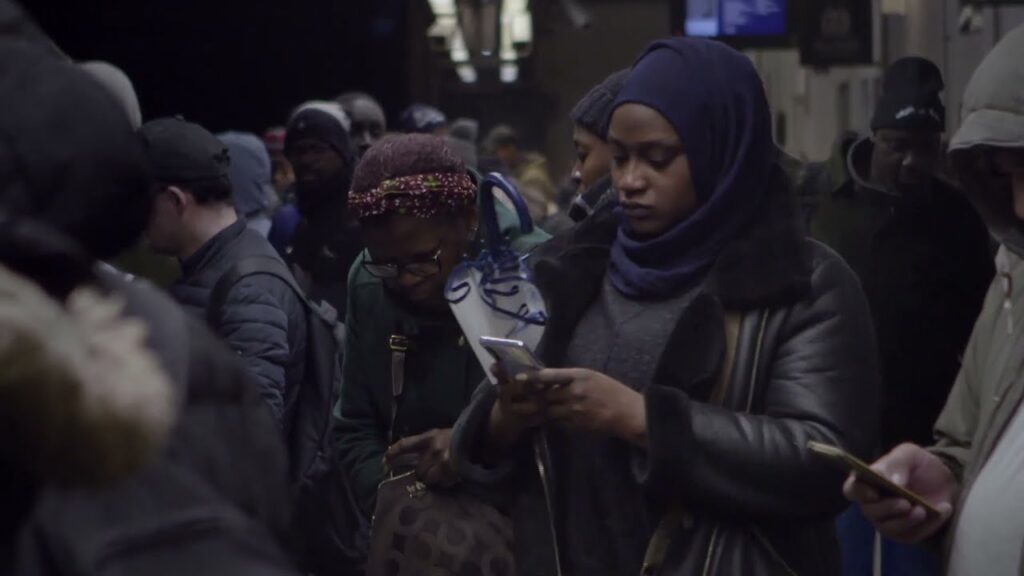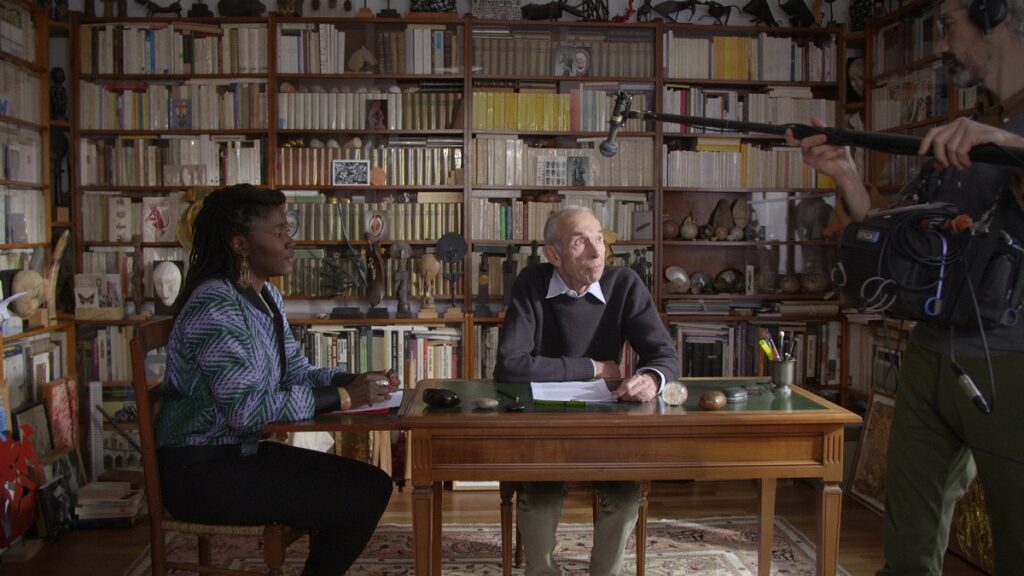Alice Diop’s NOUS/WE, winner of the 2021 Berlinale Documentary Award and Best Film within the Berlinale Encounters category, forces a conversation about what “French society” means while engaging Diop’s body of work, as a Black woman and documentarian in France. In times when the extreme right-wing scored as the third party during the 2022 French presidential and parliamentary elections, NOUS/WE is a strong political statement.
Inspired by French author François Maspero’s book “Roissy Express: A Journey Through the Paris Suburbs,” Diop uses train B, a suburban train in Paris, as a common thread between all the protagonists of her film. Launched in 1977, the train line connects Paris’ northeastern area (Charles de Gaulle Airport) to the city’s southwest (Saint-Rémy-lès-Chevreuse). An important means of transport for workers coming from countries previously colonized by France and living around the famous capital, Paris, the train also represents a strong link between communities and inhabitants who seem to never meet each other and live alongside each other.
It is said that Paris’ surroundings – also called banlieue – were considered as “one lieue from the ban,” meaning that there were territories banned from the center within a one-mile distance. People also say that, in Paris, workers lived in the east and patrons in the west, because the wind blew smoke coming out of the factories towards the east. That being said, you’ll understand that Paris’ surroundings are unequal, and the act of filming them as a “whole,” was an interesting take on representing the current French society.
In the opening of the film, a contemplative camera follows a father and his sons, looking at a deer through binoculars. They are hunters and they walk in the forest like in ancient times when hunting was one of the main activities of the French bourgeoisie.
Then the camera follows a mechanic, who speaks French and Bambara, a language from Mali, West Africa, together with a young man wearing a hoodie. The cliché clothing attribute of French boys living in the hoods has been massively relayed in the French media outlets during the 2005 revolts – considered as riots by mainstream media. When the oldest protagonist leaves his garage at the end of his day, nature is just a decoration. Trees have no leaves, grass is stuck between concrete. The landscape is made of cars, roads, and housing projects. The man lives in a truck. Far away from the hunters’ settings.
Among this collection of lives, is another one, this one from the past seen in HI-8 footage. It is the one of Alice Diop’s family herself, back in the 1990s, when her parents were still alive. Saved on top of old films recorded by her father on VHS tape are the memories of a Senegalese family established in Aulnay-Sous-Bois’ housing project (northeast of Paris). And the voice-over of the filmmaker; revisiting those images and past and remembering the unseen, the off-camera, the absence. Later in the film, while filming her partner and son in her parents’ house, Diop says: “I film the house to keep a memory.”

In one sentence, Diop adds one last element to her documentary filmography. Keeping a memory of the unseen has always been her filmmaking dedication. Especially in a society where the working force, mostly coming from countries colonized by France after the Second World War to rebuild France, is not heard. In their hope for a better life, the dream of coming back to their countries of origin was mostly pictured by finished or unfinished house constructions abroad. A dream that has been diverted by the lives and careers of their children. Born and raised in France, these children mainly grew up in housing projects built in the ’70s, infamously known as “cités.” Initially created with the goal of social cohesion in mind with the rise of unemployment and racism in the 80s, the buildings eventually failed to achieve their social and diversity objectives. As a result, their parents finally remained in a country that never considered them or their progeny as French citizens. And those citizens “coming from somewhere else,” also called “Français issus de l’immigration” (“French from immigration”) are either not considered, better considered if they achieve great things, or accused of all the society’s problems if they behave badly.
By recounting her father’s journey coming from Senegal to France in 1966, her sister’s journey as a home-based nurse in a context of hospital destruction fastened by Macron’s presidency, children sledding down sand hills, teenage girls playing with cards and mobile phones, teenage boys listening to music while seated in camping chairs, NOUS/WE becomes the final chapter of a 16-year cinematographic journey throughout Paris’ surroundings. It recounts the lives of French citizens with dual cultural heritage, and, more than ever, doesn’t distinguish them from other French citizens who can be considered ‘real French’ because they are White and Catholics.
Of course, most French people have foreign origins, including the politicians assaulting the “immigrants,” but the concept of skin color and religion plays an important role in the current struggle of living together. People live next to one another, don’t know each other, forget each other, cancel each other, or erase each other. Therefore, NOUS/WE is not only a reflection of French immigration, it is a strong reflection of French society itself, from crowded churches to hunting places, from the richest neighborhoods to the poorest ones, and from white citizens to Black citizens. In an interesting discussion with Diop, François Maspero (invited to revisit his book in the film), also points out the urge to represent the unrepresented in a French society where universalism is the main concept (“Human Beings are born and remain free and equal in rights”), one that is untrue but cannot be disputed.

Starting from La Tour du Monde (2005) in which Diop meets families from different parts of the globe living in the same housing project in Aulnay-sous-Bois; followed by Clichy sans Cliché (2005) about the inhabitants’ perspectives of the city where the social revolts of 2005 started; Les Sénégalaises et la Sénégauloise (2007) confronting her duality as a French citizen member of a Senegalese family; Danton’s Death (2011) about Steve Tientcheu’s journey to becoming an actor in a Parisian school (known as Le Maire in Ladj Ly’s Les Misérables and Barbe Noire in Philippe Lacôte’s Night of the Kings), Alice Diop received a French César for Best short film in 2017 with Towards Tenderness, a short that records men’s reflections about their difficult access to love and tenderness, which was followed, in 2017 by On Call (2017), about medical services for immigrants in a hospital close from Paris. Covering the existence, resilience, and wounds of an unseen part of French society, Alice Diop is one of the major filmmakers in France today. And her upcoming narrative feature, Saint-Omer, about a 2013 highly publicized matricide committed in France by a Senegalese woman, is much anticipated.
NOUS/WE is now streaming on MUBI.
Claire Diao is the cofounder of the Panafrican Film Critic Magazine Awotele (www.awotele.com). She received the 2018 Beaumarchais Medal by the French Authors Society SACD for her essay Double Vague, le nouveau souffle du cinéma français (Au Diable Vauvert ed., 2017), recounting the career and journeys of 50 French filmmakers with a double culture heritage, including Alice Diop.
